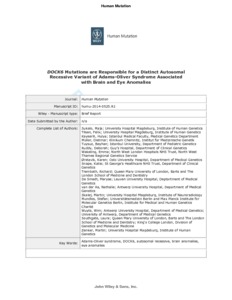Sukalo, M;
Tilsen, F;
Kayserili, H;
Müller, D;
Tüysüz, B;
Ruddy, DM;
Wakeling, E;
Ørstavik, KH;
Snape, KM;
Trembath, R;
et al.
Sukalo, M; Tilsen, F; Kayserili, H; Müller, D; Tüysüz, B; Ruddy, DM; Wakeling, E; Ørstavik, KH; Snape, KM; Trembath, R; De Smedt, M; van der Aa, N; Skalej, M; Mundlos, S; Wuyts, W; Southgate, L; Zenker, M
(2015)
DOCK6 mutations are responsible for a distinct autosomal-recessive variant of Adams-Oliver syndrome associated with brain and eye anomalies.
Hum Mutat, 36 (6).
pp. 593-598.
ISSN 1098-1004
https://doi.org/10.1002/humu.22795
SGUL Authors: Snape, Katie Mairwen Greenwood Southgate, Laura
![[img]](https://openaccess.sgul.ac.uk/110209/1.hassmallThumbnailVersion/Sukalo_HumMut2015.pdf)  Preview |
|
PDF
Accepted Version
Available under License ["licenses_description_publisher" not defined].
Download (1MB)
| Preview
|
Abstract
Adams-Oliver syndrome (AOS) is characterized by the association of aplasia cutis congenita with terminal transverse limb defects, often accompanied by additional cardiovascular or neurological features. Both autosomal-dominant and autosomal-recessive disease transmission have been observed, with recent gene discoveries indicating extensive genetic heterogeneity. Mutations of the DOCK6 gene were first described in autosomal-recessive cases of AOS and only five DOCK6-related families have been reported to date. Recently, a second type of autosomal-recessive AOS has been attributed to EOGT mutations in three consanguineous families. Here, we describe the identification of 13 DOCK6 mutations, the majority of which are novel, across 10 unrelated individuals from a large cohort comprising 47 sporadic cases and 31 AOS pedigrees suggestive of autosomal-recessive inheritance. DOCK6 mutations were strongly associated with structural brain abnormalities, ocular anomalies, and intellectual disability, thus suggesting that DOCK6-linked disease represents a variant of AOS with a particularly poor prognosis.
| Item Type: |
Article
|
| Additional Information: |
Correction available at http://doi.org/10.1002/humu.22830
This is the peer reviewed version of the following article: Sukalo, M. , Tilsen, F. , Kayserili, H. , Müller, D. , Tüysüz, B. , Ruddy, D. M., Wakeling, E. , Ørstavik, K. H., Snape, K. M., Trembath, R. , Smedt, M. , Aa, N. , Skalej, M. , Mundlos, S. , Wuyts, W. , Southgate, L. and Zenker, M. (2015), DOCK6 Mutations Are Responsible for a Distinct Autosomal‐Recessive Variant of Adams–Oliver Syndrome Associated with Brain and Eye Anomalies. Human Mutation, 36: 593-598., which has been published in final form at https://doi.org/10.1002/humu.22795. This article may be used for non-commercial purposes in accordance with Wiley Terms and Conditions for Use of Self-Archived Versions. |
| Keywords: |
AOS, Adams-Oliver syndrome, DOCK6, brain anomalies, eye anomalies, Adolescent, Brain, Child, Child, Preschool, Ectodermal Dysplasia, Eye Abnormalities, Female, Genes, Recessive, Genetic Association Studies, Guanine Nucleotide Exchange Factors, Humans, Infant, Infant, Newborn, Limb Deformities, Congenital, Magnetic Resonance Imaging, Male, Mutation, Scalp Dermatoses, Tomography, X-Ray Computed, Young Adult, Adams-Oliver syndrome, AOS, DOCK6, brain anomalies, eye anomalies, 0604 Genetics, 1103 Clinical Sciences, Genetics & Heredity |
| SGUL Research Institute / Research Centre: |
Academic Structure > Molecular and Clinical Sciences Research Institute (MCS)
Academic Structure > Molecular and Clinical Sciences Research Institute (MCS) > Cell Sciences (INCCCS) |
| Journal or Publication Title: |
Hum Mutat |
| ISSN: |
1098-1004 |
| Language: |
eng |
| Publisher License: |
Publisher's own licence |
| Projects: |
| Project ID | Funder | Funder ID |
|---|
| DFG ZE 524/2‐3 | German Research Foundation | UNSPECIFIED |
|
| PubMed ID: |
25824905 |
| Web of Science ID: |
WOS:000354623500004 |
| Dates: |
| Date |
Event |
| 2015-05-18 |
Published |
| 2015-04-21 |
Published Online |
| 2015-03-27 |
Accepted |
|
 |
Go to PubMed abstract |
| URI: |
https://openaccess.sgul.ac.uk/id/eprint/110209 |
| Publisher's version: |
https://doi.org/10.1002/humu.22795 |
Statistics
Item downloaded times since 05 Oct 2018.
Actions (login required)
 |
Edit Item |



